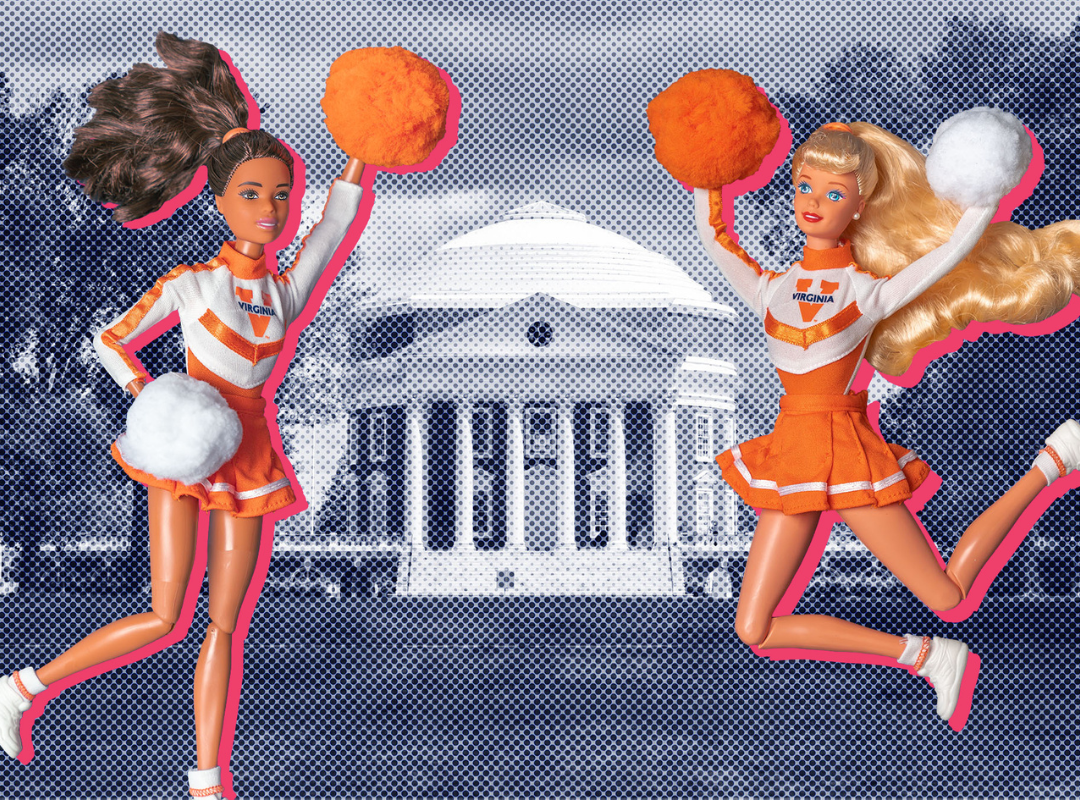
UVA Barbie header photo credit: Erin Edgerton and Johnny Utterback, University Communications
We're back in Hooville! Or, as we at Iris Magazine like to call it, Weird Orange-and-Blue Barbie Land!
At Iris, we love a well-told story, and to get everyone excited for the year ahead we wanted to call attention to the highs and lows of Hoo-adjacent stories you may have missed over the summer. You'll gasp. You'll laugh (in spite of yourself). You’ll hope to have your faith in humanity restored - and you will!
We'll start with “Midsummers is anything but ‘mid.’” In excruciating detail, the article describes the exploits of UVA students following tradition (in the manner of National Lampoon’s Animal House) at this year's Midsummers bacchanal. Written by a Daily Progress undergraduate intern, the piece is a tour de force of immersive journalism, with photos and anecdotes too real to be believed and definitely NOT to be tried at home.
There’s the rising third year who describes being “incoherently high” while eating the contents of “an abandoned Wawa takeout bag on the sidewalk”:
“I’m chomping on that thing, it’s like a burger and fries, and it had been out in the heat all day,” she said. “I’m three quarters of the way there, I take a bite and put it down, I look down and there’s literally ants and bugs swarming all around.”
There’s the elderly couple taking in the view of Mad Bowl partiers as they pass by a “a group of male students” urinating near a dumpster:
“These girls are half-naked,” the woman said, who declined to give her name but noted she attended Penn State 60 years ago. “What are those jugs they’re all holding?”
The jugs were BORGs, an acronym for “Blackout Rage Gallon,” a recent social-platform-that-must-not-be-named trend popular among college students. Partakers start by emptying a half-gallon of water and filling the rest with hard alcohol and a mixer. Then they give their BORG a name, written on the container in Sharpie, where a pun is obligatory: “Borg in the U.S.A.,” “Borganelle, the powerhouse of the cell,” “Hoos a good borg,”
Read the whole thing for the full “I can’t believe these people talked to a reporter” effect. This must-read plays right into the stereotype of Mr. Jefferson’s University as a party playground for the privileged. Much like Ken’s Mojo Dojo Casa House. (Yes, we’re still Barbie-obsessed.)
But if Barbie taught us anything, it’s that stereotypes don’t define the person or the place. All of us at UVA are evolving, becoming, negotiating the cognitive dissonance of societal expectations versus our own hopes and dreams. We’re all Stereotypical Barbie going to the gynecologist for the first time! We’re all Beach Ken reaching for that state of Kenough! And darn it, maybe we’re all just Alan!
Guess who almost certainly (maybe?) agrees with Barbie on this point? Our very own (much shorter) Ryan Gosling, President Jim Ryan, who delivered a tender, stand-up-and-cheer address at this year’s Fourth of July citizen naturalization ceremony at Monticello.
Opening and closing his remarks with a story about a young Irish woman who immigrated to New York and gave her child up for adoption, Ryan offered three suggestions to the crowd of new citizens, which apply equally well to all of us starting the new academic year at UVA:
1. Listen to people’s stories
Everyone has one, and they are rarely what you would predict. I encourage you to look past labels, whatever they might be--whether president, immigrant, democrat, republican, college graduate, lawyer, doctor, plumber, carpenter, truck driver or tesla driver—look past these labels and learn someone’s full story….To learn someone’s story you need only ask, but it’s best done in person. It’s amazing what you will learn.
2. Continue to write your own story
You all have remarkable stories about what led you to this point. But your stories are not yet complete. Indeed, you are about to write a new chapter. I’m filled with questions for you, starting with: What’s next? Will you continue your education? Will you start a new business or change careers? Will you build a family? Discover friends who become like family? Whatever you choose, make it your story and your choice, and never forget that it remains possible in this country to write your own story, as generations of new citizens have done before you.
….combine talent and hard work to take advantage of the opportunities in front of you and write the story that you want to be your own.
3. Contribute to the unfolding story of this country
There is nothing that we the people have done in our worst moments that cannot be fixed by what we the people can do at our best. My request is that you help we the people, of whom you are a part, be our best. Vote, run for office, volunteer, lend a hand, stay informed. Learn from the stories of those who sacrificed to provide the opportunities before each of us today. Help us hear and heed, as Abraham Lincoln said, the better angels of our nature.
And all of that begins, as I said earlier, by learning each other’s stories. By getting past labels. By looking and listening for what you have in common rather than what you don’t, whether it’s your devotion to your children, your parents, or your god; a love of sports, or the beach, or the mountains; a love of camping or a distaste for camping; a favorite movie or tv show. Find a connection. Keep an open mind and open heart. And be prepared to be surprised by what you learn.
You know that moment in Barbie when Stereotypical Barbie looks at the elderly woman at the bus stop and somehow sees not an old crone, but instead the textured beauty of a full life, wrinkles and all? And she gets all teary? That’s kind of how we felt when Jim “Old Man Gosling” Ryan got to the end of his speech.
It’s kind of how we hope you’ll feel, too, as you read it and head into the new academic year, even if you feel the cognitive dissonance that Gloria (America Ferrera) lays out in her infamous Barbie monologue: “Like, we have to always be extraordinary, but somehow we’re always doing it wrong.”
Consider the heart behind Ryan’s words:
To close with an example: my current label is university president, and that might lead you to believe that I specialize in delivering boring speeches, which in my case would unfortunately be true. You might also think we have little in common. But what you might not know is that my fuller story is a part of Anne Doherty’s story, the story of the Irish immigrant I told you about at the beginning of this speech. The son she placed for adoption, in the hope that he would have a better life, is me.
Anne and I finally met just ten years ago….Anne welcomed me into her family, and it has been one of the most touching surprises in my life—and it has made me appreciate, even more, the courage, curiosity, hardships, and determination of those immigrants, like all of you, who seek to make a life in this country. As the biological child of an immigrant, I feel connected to these stories—to your stories. I hope that in sharing mine you see even more clearly that you can never guess someone’s story just by looking at their labels.
This year, fellow Hoos, connect through your ordinary, extraordinary stories. Or as No-Longer-Stereotypical Barbie says, “...be part of the people that make meaning, not the thing that is made.”

